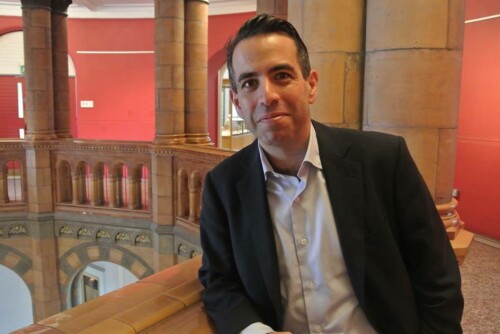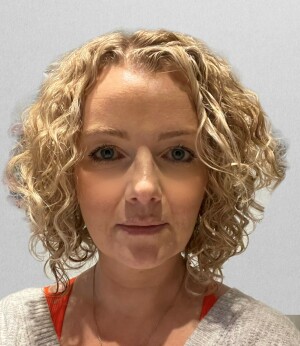Our research prioritises the needs of the secondary breast cancer community.
With the support of our community, we're able to fund research that contributes to advancing an increased quality of life for patients. We work with oncologists, health researchers and scientists based in the UK who undertake world-class research into addressing areas of unmet need in secondary breast cancer. Information on our current research is below.

HER2+ CNS SURVEILLANCE Study
 Professor Carlo Palmieri, University of Liverpool, and Dr Sara Meade, University Hospitals Birmingham
Professor Carlo Palmieri, University of Liverpool, and Dr Sara Meade, University Hospitals Birmingham
In 2023 Make 2nds Count awarded our largest research grant to date, committing £219,560 across 3 years, to co-fund a new study in partnership with Breast Cancer Ireland. The HER2+ CNS SURVEILLANCE study is taking place across the UK & Ireland, investigating screening secondary breast cancer patients for brain metastases before they become symptomatic. Recruitment of patients will start in 2025.
Patients with HER2-positive secondary breast cancer are at much higher risk of the disease spreading to the brain but there is currently no regular screening regime to identify any metastases before symptoms show. The HER2+ CNS SURVEILLANCE study aims to investigate the feasibility of recruiting HER2-positive secondary breast cancer patients with no signs of brain metastases, conducting an initial MRI brain scan for brain metastases detection and then randomising patients into two groups: one to receive six-monthly MRI brain scans for a year and another who will not receive the additional scans – the current standard.
The PRIMROSE Studies
 Professor Carlo Palmieri, University of Liverpool
Professor Carlo Palmieri, University of Liverpool
Make 2nds Count is co-funding the analysis of samples collected in the PRIMROSE Cerebrospinal fluid (CSF) study which is conducting research into breast cancer that as spread to the brain, known as brain metastases or brain mets. CSF is a colourless, watery fluid that flows in and around the brain and spinal cord. This study aims to collect CSF from secondary breast cancer patients with brain metastases to better understand this disease.
The CSF will be analysed with modern genomic techniques to investigate DNA that has been shed by the brain metastases to identify the DNA mutations present. This information will contribute to research that will help identify what drugs may work best to treat brain metastases.
The PRIMROSE CSF study sits alongside the PRIMROSE Tissue study, which utilises cancer samples previously collected from routine biopsies. Both the PRIMROSE CSF and PRIMROSE Tissue studies are recruiting patients now. You can read more about this research here.
The PRIMROSE CSF study is funded by Daiichi Sankyo GmBH Europe, North West Cancer Research and Make 2nds Count.
Insomnia Intervention Study
 Dr Leanne Fleming, University of Strathclyde, Glasgow
Dr Leanne Fleming, University of Strathclyde, Glasgow
In 2024 Make 2nds Count awarded £186,500 across 3 years to fund a research study that will produce and evaluate an insomnia intervention for secondary breast cancer patients. Recruitment of patients and other stakeholders (carers and healthcare professionals) will start in 2025 across two study sites (the NHS Greater Glasgow and Clyde and NHS Lothian regions).
Around 40% of people living with breast cancer have insomnia, which negatively affects their quality of life and leads to other mental and physical health problems. Cognitive Behavioural Therapy (CBT) has been used to successfully treat insomnia in survivors of primary breast cancer. However, secondary breast cancer patients have been excluded from these studies and therefore it remains unknown if CBT could treat insomnia in these patients. This study aims to address this knowledge gap by exploring the feasibility, acceptability and preliminary effectiveness of a CBT-based insomnia intervention for secondary breast cancer patients. The study will run workshop and stakeholder engagement events with patients, carers and healthcare professionals to ensure the tailored CBT intervention is informed by the expertise and lived experience of these stakeholders.
ATHENA: A study exploring the potential for Anti-psma THErapy in triple-Negative breast cAncer
 Dr Karen DeSouza and Dr Stefan Vöö, University College London Hospitals NHS Foundation Trust
Dr Karen DeSouza and Dr Stefan Vöö, University College London Hospitals NHS Foundation Trust
In 2024 Make 2nds Count awarded £34,000 towards a 2-year pilot research project investigating a new molecular target in secondary Triple Negative Breast Cancer (TNBC).
TNBC tumours lack receptors for the hormones oestrogen and progesterone and also lack Human Epidermal Growth Factor Receptor 2 (HER2). Many cancer treatments (such as hormonal therapy and anti-HER2 therapies) can target these receptors, but can't be used in the treatment of TNBC. This makes TNBC harder to treat as less treatment options are available.
A newly researched molecular target, known as FOLH1/PSMA, is expressed in up-to 60% of TNBC tumours. This study aims to investigate the expression of this new target in 10 secondary TNBC patients by utilising sophisticated molecular imaging techniques. Participants with high levels of FOLH1/PSMA expression will be offered two cycles of intravenous anti-PSMA therapy, which is a type of radioactive molecule. This treatment selectively targets TNBC tumour cells that express FOLH1/PSMA and therefore aims to minimise harm to healthy tissues.
The collected data, experiences and outcomes of this study will inform the development of a larger study with more participants.
